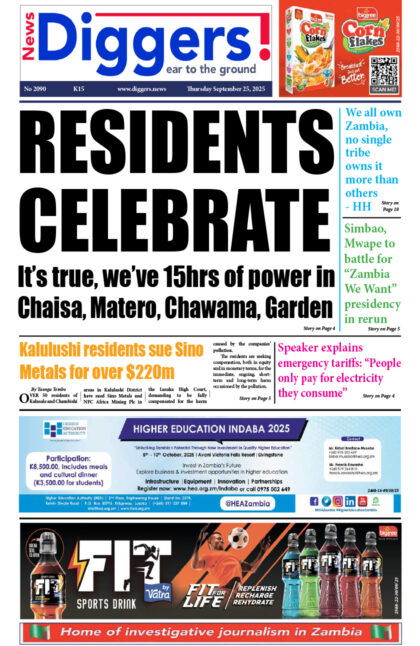Tax experts say the erratic frequent changes to the Zambian mining fiscal regime in the last four years have damaged its credibility and have led to negative relations between government and the industry.
According to a study, Lifting the Veil of Secrecy: Perspectives on International Taxation & Capital Flight from Africa, authored by former Bank of Zambia governor, Dr Caleb Fundanga, among several others, the erratic frequent changes to the Zambian mining fiscal regime in the last four years have damaged its credibility, and have led to negative relations between government and the mining industry.
It stated that the government should ensure that mining fiscal regimes are predictable to guarantee stability for investors, even after a change of government, to avoid unnecessary friction from the extractive sector.
In January 2015, the PF-led government, under newly-elected President Edgar Lungu, had introduced a single mining tax regime with mineral royalty levels of 20 per cent for open pit mines and nine per cent for underground operations.
But the high royalty levels only lasted less than six months in 2015 as they were slashed to nine per cent for open cast mines and six per cent for underground mines by June that same year after mining entities threatened to close down their operations and retrench thousands of workers.
By the end of 2015, however, close to 10,000 workers lost their jobs, mainly on account of the frequent changes in the fiscal regime, which mining experts cited as a key reason for the instability that rocked the sector.
To amplify its problematic nature, former Mines Minister, Christopher Yaluma, revealed during the sixth Zambia International Mining and Energy Conference (ZIMEC) Exhibition at Lusaka’s Government Complex in June, 2016, that no mining company paid the 20 per cent mineral royalty tax the government introduced in 2015.
And according to data from a chapter in the study, which analysed the rise and fall of the mineral royalty tax (MRT), the erratic frequent changes to the fiscal regime in recent years have damaged its credibility, and have led to negative relations between government and the mining industry.
“The erratic and frequent changes in the mining tax regime, especially since 2009, have damaged the credibility of the mining tax regime in Zambia and have had negative impacts on trust relations between the government and the industry. Stability does not imply that changes cannot be made, but these should be well prepared and based on consultations with key stakeholders,” the study noted.
It stated that government should always aim to ensure a consensus among key stakeholders as a prerequisite for a sustainable fiscal regime.
“Interviews conducted by the research team with a large number of stakeholders in the private and public sectors in Lusaka in 2015, found that ‘consultations’ of any substance between the government and the industry on the new mining tax legislation were largely missing or dysfunctional,” revealed the study.
“Most were taken by surprise by the new royalty rates and were only made aware of them when the Budget was announced by the Minister of Finance in October, 2014. The absence of real and substantive consultations on major tax reforms have contributed to undermine trust between the industry and the government.”
The study further advised government to ensure tax systems, especially in the extractives industry, should be simple to understand and implement for both tax administrators and taxpayers.
Since the turbulence experienced between 2014 and 2015, Cabinet approved new mining tax measures on February 17, 2016, which saw the re-designing of the tax regime for mining operations in a bid to sustain operations.
Among the key measures was the introduction of a varied mineral royalty rate for copper based on the prevailing price on the international market, commonly referred to as the ‘sliding scale’; a flat mineral royalty rate of five per cent for other base metals and a flat mineral royalty of six per cent for precious metals and gemstones.
The book, Lifting the Veil of Secrecy: Perspectives on International Taxation & Capital Flight from Africa, was produced as part of a research project: Taxation, Institutions and Participation (TIP).
TIP investigates the effects of tax havens on domestic revenue systems, institutions and on citizen participation in African countries.
























